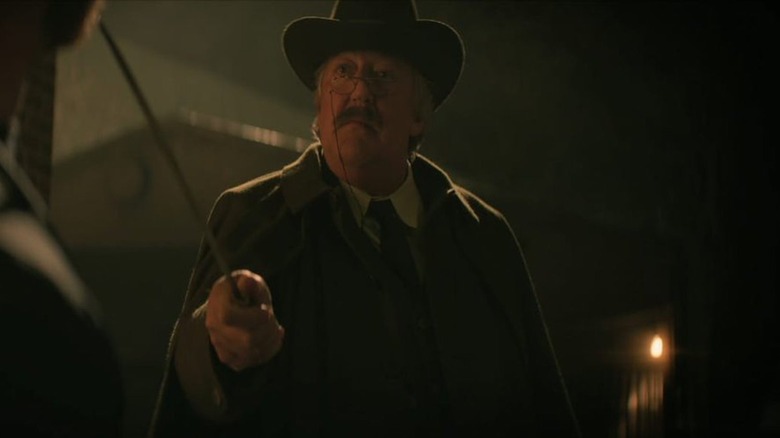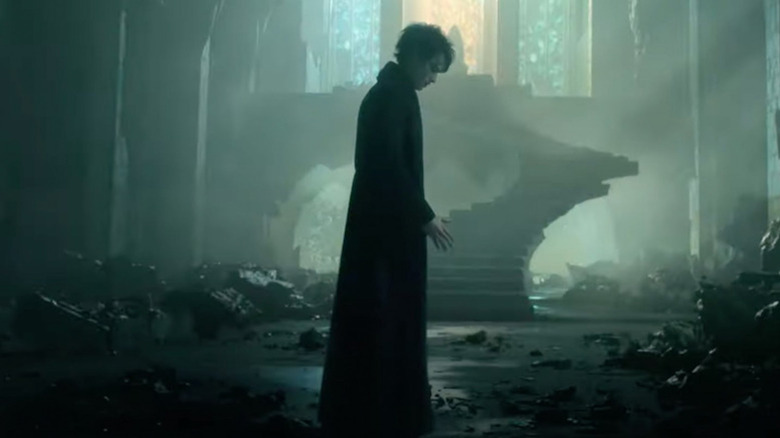Neil Gaiman Leaked 'Really Stupid' Sandman Script From Jon Peters (Which Featured Giant Mechanical Spiders)
When Neil Gaiman's "Sandman," one of the most stirring and enveloping sagas I've ever experienced in any medium, at long last found safe harbor at Netflix, I was relieved. Even if the live-action adaptation of arguably the greatest comic book series ever written fell short of my fevered imagination, it would at least be realized on the author's terms. And this was important to me not only because I adore the work, but because I know how very, very wrong it could've gone had Warner Bros. moved forward with William Farmer's rewrite of Ted Elliott and Terry Rossio's screenplay adaptation in 1998.
Everything I just said about "Sandman" as a comic book? The extreme opposite goes for Farmer's script. We've seen great works of fiction travestied by misguided screenplays: Brian De Palma's "The Bonfire of the Vanities" is a miscast gutter-ball that veers from satire to caricature; Robert Benton's "Billy Bathgate" is a listless, play-the-hits walk-through of a lively, Huck-Finn-in-gangland yarn; Roland Joffe's "The Scarlet Letter" is, quite simply, a turd.
The worst screenplay ever written
To be fair to Farmer (who did not go on to have a successful career in Hollywood, so it's a little mean to keep kicking this corpse), his draft of "Sandman" appears to have been written absent any foreknowledge of Gaiman's comic. Most likely, this guy was handed an assignment from notoriously spacey/combative producer Jon Peters and did as he was told.
Peters, a motor-mouthed hairdresser who charmed Barbara Streisand into granting him entree to the upper echelon of the Hollywood studio power structure (in the early 1990s, he conned Sony into letting him run their recently acquired Columbia Pictures with his partner Peter Guber), didn't know the first thing about comic books. How could he? He was illiterate. But he lucked his way into enough high-profile hits to land a non-exclusive deal with Warner Bros. in 1994. He controlled "Superman" and had final say on a film adaptation of "Sandman." And while he had no idea how to make these movies work, he was fixated on one element: they had to have a giant mechanical spider.
Now that "Sandman" is hanging around in Netflix's global top 10, Gaiman has loosened up a bit, which means he's finally dishing on something I've had to keep quiet about for over 20 years.
Gaiman's gambit
Farmer's "Sandman" script was a debacle, but at the time, WB execs, who were also clueless about Gaiman's work, thought the tyro screenwriter had delivered a makeable movie. It had a clean arc, lots of action, and a twist ending. Unfortunately, they weren't making "U.S. Marshals." They were making "Sandman." So a chase movie where Morpheus is scrambling to recover the bag of sand, the ruby, and the helmet before the end of the millennium — this was written in the late 1990s, when everything needed a millennial hook — really wasn't anywhere in the ballpark of what turned people on to Gaiman's highly literate series.
When Gaiman read Farmer's screenplay, he was understandably appalled. He was also worried that WB would do to his baby what they'd done to the caped crusader just one year earlier via "Batman & Robin." So the internet-savvy author sent Farmer's screenplay to Ain't It Cool News' Harry Knowles, the one-time movie website kingpin who, at the time, was terrorizing Hollywood with write-ups of test screenings and early-in-development projects catering to the geek market. Harry was as up on "Sandman" as Peters, but his well-read second-in-command, Drew "Moriarty" McWeeny, knew the material well. So Drew leaped into the fray and drove a stake directly into the heart of Farmer's script.
WB has never understood DC
How tone-deaf was the script? Here's some sample dialogue: "As though your puny weapons could harm Morpheus! The lord of sleep! The Sandman!"
I read it a couple of months after Drew's evisceration and was stunned not only by the profound misunderstanding of Gaiman's work but its lack of purpose. "Sandman" was not a saleable brand name. As Gaiman told Rolling Stone, "I'm not sure if it would've been an action movie or quite what it would've been. It was a mess. It never got better than a mess."
But "a mess" does not properly capture the wretched essence of this misbegotten amalgamation of words. For some reason, there were giant mechanical spiders shoehorned into the narrative. None of this made sense until I heard Kevin Smith talking about his kiboshed "Superman" screenplay on "The Howard Stern Show."
For reasons that baffled the writer-director of "Clerks," he found himself pitching a Man of Steel reboot to WB in the late '90s. Garnering a greenlight was reliant on the approval of Peters, who, as Smith entertainingly explained in one of his quasi-lectures, didn't understand "Superman" at all.
Superman without Superman
Peters expected three things from Smith's script. "One, I don't want to see him in that suit; two, I don't want to see him fly; and, three, he's got to fight a giant spider in the third act." The giant spider was non-negotiable. The man had arachnids on the brain.
While Superman fighting a giant spider in the third act of a film wouldn't be entirely beyond the superhero pale, Morpheus being thrust into a derring-do narrative, where brawn outweighs wit, would've been a hilarious betrayal of the character. Still, had Gaiman not fired that Farmer draft off to AICN, that film might've gotten made. Sure, it sounds awful, but worse than Ralph Fiennes and Uma Thurman getting slapped together for an unasked-for, big-screen take on the cult TV hit "The Avengers?" Under the staid, suit-and-tie leadership of execs Bob Daley and Terry Semel, this company was lost. Quality wasn't a consideration.
Peters was eventually slipped out the WB back door, though he did get producer credits on "Man of Steel" and "A Star Is Born." Your mileage will probably vary as to how WB has treated "Superman" over the last two decades, but when it comes to Gaiman's "Sandman," be of good cheer. The comic book might be resistant to a satisfying live-action rendition, but at least it didn't go the route of, say, "Jonah Hex" (co-written by William Farmer).




